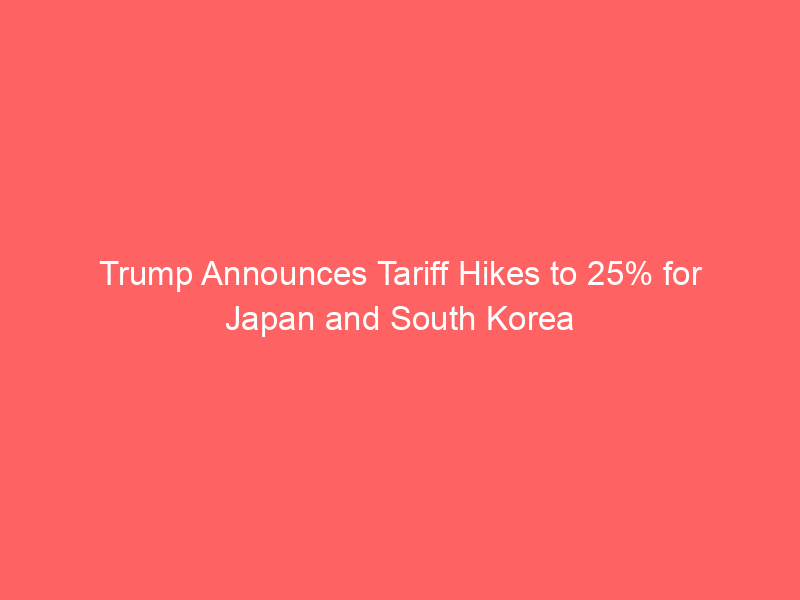In a surprising move, former President Donald Trump has announced significant tariff increases targeting Japan and South Korea. This decision, which raises tariffs to 25%, marks a notable shift in U.S. trade policy with these key Asian allies. The announcement has sparked a flurry of reactions from governments, businesses, and trade experts, all scrutinizing the potential repercussions on international relations and economic stability.
Trump Announces 25% Tariff Hikes on Japan and South Korea
Donald Trump recently issued a formal letter to Japan and South Korea, signaling his intention to dramatically escalate tariffs on imports from both countries. In the letter, he described the tariff hikes as a necessary step to protect American industries and ensure a more equitable trading environment. The move follows years of negotiations and ongoing disputes over trade imbalances, particularly in the automotive and technology sectors.
The decision to impose a 25% tariff is unprecedented for these allies, as previous measures aimed at encouraging fair trade rather than punitive tariffs of this magnitude. Trump emphasized that these tariffs are a response to perceived unfair practices and insufficient market access, framing them as a leverage tool to renegotiate better terms. The letter also highlighted his belief that it’s a “grand honor” to send such a message, underscoring the seriousness of this diplomatic gesture.
Japan and South Korea have responded cautiously, condemning the tariff increases and warning of potential retaliation. Both nations reaffirm their commitment to free trade and expressed concern about the economic fallout that such tariffs could trigger. Experts warn that this move could disrupt supply chains, increase costs for consumers, and complicate diplomatic relations in the region, marking a tense chapter in U.S. Asia-Pacific trade diplomacy.
Impact of New Tariffs on US Trade Relations with Asia
The announcement of these tariffs is poised to reshape the landscape of U.S. trade relations with Japan and South Korea. On one hand, supporters argue that higher tariffs could pressure these countries to open their markets further and address long-standing trade disparities. They believe this approach might finally bring balance to the economic relationship and bolster American manufacturing sectors.
However, critics warn that such tariffs risk igniting a trade war, leading to retaliatory measures from Japan and South Korea. Historically, increased tariffs have often resulted in decreased exports, which could hurt American exporters and industrial sectors. The impact might extend beyond immediate trade disruptions, potentially straining diplomatic ties and undermining cooperation on regional security issues.
Furthermore, the broader global economic environment could feel the ripple effects of this policy shift. Investors tend to react negatively to trade tensions, possibly leading to market volatility. At a time when international economic stability is fragile, the tariffs could complicate efforts to promote free trade and economic growth in the Asia-Pacific region, forcing policymakers to navigate a delicate balance between protecting domestic interests and maintaining global partnerships.
As the United States adopts these aggressive tariff measures, the coming weeks will be crucial in determining the future direction of U.S.-Asia trade relations. While the move underscores a tough stance on trade fairness, it also raises concerns about escalating tensions and economic repercussions. Both Japan and South Korea will be watching closely, hopeful for dialogue and resolution, even amid the uncertainty. Ultimately, this development serves as a stark reminder of how trade policies can dramatically influence diplomatic ties and international economic stability.








